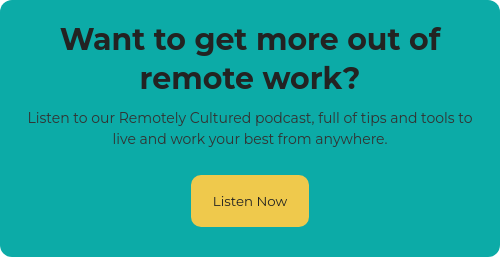It’s no secret that the COVID-19 pandemic threw nearly every professional, regardless of industry, for a pretty big loop in 2020. With 42 percent of employees across the U.S. now working remotely, the virus has brought us more than the fashion face mask and a toilet paper crisis — it has also brought about a shift in the way employers view remote work.
This is great news for traditional employees, many of whom are experiencing the freedom of being unchained from their cubicle desk for the first time. But it’s news that also brings a sense of foreboding to one subset of professionals: the digital nomad elite. Here, we’re taking a deeper look at how the pandemic has affected their careers, and what might be waiting as our collective business values begin to shift.
Who Are the Digital Nomad Elite?
They are small, but they are mighty. They are the pioneers of the digital nomad lifestyle, the early rebels who decided they could one-up the work-from-home lifestyle and instead work from anywhere. Digital nomads comprise around 7.3 million American professionals, mainly Millennials and Gen-Xers, who value exploration, adventure, and freedom, and intertwine these values with their career goals. Technological advances in recent years have offered digital nomads a literal world of possibilities, accessible from anywhere with open borders and strong Wi-Fi.
How Have Digital Nomads Been Impacted by the Coronavirus?
To be sure, digital nomads have been preparing for the remote work revolution for a long time now. They are well-versed in the technology that makes remote work possible, and they knew how to Zoom before it was cool. While their skills and experiences put them ahead of the curve early on in the pandemic, their lifestyle also made them vulnerable to some unique challenges.
-
Travel Restrictions. As quarantine swung into high gear, many digital nomads found themselves in a tough spot, making decisions about whether to shelter in place or try to return to home base before borders closed. Some digital nomads found themselves stuck in unfamiliar countries, while others discovered that, as cases soared back at home, their U.S. passport was more of a hindrance than a help. Now, even with the world beginning to reopen, many digital nomads are still dealing with hassles surrounding travel, from limited housing capacity and canceled flights, to outright restrictions on traveling to/from the U.S.
-
Disconnect and Isolation. The digital nomad lifestyle is already a solitary one at times, which is why many travel with spouses or friends or seek out opportunities to connect in their temporary hometowns. But with COVID-19 restrictions, these opportunities have been cut short. Popular cafes and restaurants with good Wi-Fi that allow nomads to linger now enforce rules around masks, social distancing, and maximum capacity. Coworking companies have faced obstacles as well, as the workforce has been tethered. Outsite founder and CEO Emmanuel Guisset says some of his company’s coworking locations have scaled down or closed completely in the wake of the virus, while more members are using the brand’s online networking tools, rather than in-person benefits, to stay connected during this time.
-
Greater Competition. The biggest challenge for digital nomads is yet to come as they wait to see how the broader adoption of the remote work life will impact them. Most remote workers new to the work-from-anywhere hustle are already employed by companies that have shifted to remote work in response to the virus, but what will happen if/when those businesses revert to in-office operations? Will employees who’ve had a taste of WFH freedom look to other opportunities? The level of competition in the digital nomad world post-COVID-19 remains to be seen.
The Changing State of Remote Work in the U.S.
While competition for digital nomad jobs is expected to grow, the number of remote positions may be on the upswing as well. While there are certainly many professionals who have or will return to business as usual in Q4, most companies are evaluating and even restructuring their current operations to become more remote-friendly. Businesses are pivoting in several key ways:
-
Long-Term Remote Work. This is currently the most popular model for many large brands, including Facebook, Amazon, Microsoft, and more. These companies are extending work-from-home opportunities for all employees well into 2021. Some have set hard return dates (which will likely be evaluated and possibly extended), while others have implemented an indefinite timeline or have allowed employees to choose their own return when they feel it is safe for them to do so.
-
Hybrid Operations. Companies like Infosys, Siemens, and others are taking the “best of both worlds” approach, shifting a percentage of employees to permanent remote work while the remaining percentage works in-office, or offering employees a 50/50 split week, opting to work from home on set days.
-
Permanent Remote Shift. Other companies have gone all in on remote work, with brands like REI and Pinterest pulling out of lease agreements to embrace permanent remote employment. Slack, Zillow, and Coinbase are opting for a “remote-first” model, ensuring all new hires will be remote-only and transitioning facilities to coworking spaces for team meetings and essential work only.
How Can Digital Nomads Compete Once the Workforce Is Flooded with Remote Workers?
The truth is, we don’t know what will happen to the digital nomad collective as the situation continues to evolve. It’s likely that more professionals will turn to the digital nomad lifestyle now that they’ve had a taste of remote work, but it also seems likely that more companies will offer work-from-anywhere employment as the perception of remote work shifts and its efficacy is proven. In the midst of uncertainty, the one thing digital nomads can control is their response to it. In this case, planning and preparing for both greater competition and greater opportunity.
-
Shift Your Mindset. If your wanderlust is feeling a little parched these days, start thinking of ways to quench it in your own backyard. Some digital nomads, grounded by international travel restrictions, are taking to RVs and campers to explore parts of their home country. Bonus: if your home is on four (or six or eight) wheels, you’ll never have to worry about lodging while you wander.
-
Look for Friendly Faces (and Countries). While a U.S. passport might get you shut down in some places right now, other countries are happy to have you, and they’re throwing open the doors (and handing out the visas) to prove it. Countries like Estonia, Georgia, and Barbados offer digital nomad visas, good for up to one year of residency.
-
Grow Your Passive Income Channels. The more opportunities you create to generate income, the better prepared you’ll be to face an influx of remote workers post-COVID. Learn more about what constitutes passive and semi-passive income, and find out how it can work for you.
-
Do Your Research. Sure, there will soon be a lot of digital wanderers vying for remote jobs, but you can also anticipate there will be a lot more jobs to compete for. Start looking into companies that hire remotely now, so that if and when you need options, they’ll be ready and waiting.
-
Stay Connected. Networking with other digital nomads serves a couple pretty important purposes. First, it meets your emotional and social needs, especially when you’re living a nomadic, somewhat isolated lifestyle. Second, it helps you connect with other professionals who understand your values and work ethic. They can often offer hot tips on open positions, provide referrals, and give recommendations. Fairytrail and Campfire are two we recommend to build connections both personal and professional.
If 2020 has shown us anything, it’s that the work world as we know it will never be the same. Nine-to-five office jobs may well be a thing of the past. As a digital nomad, you’ve experienced the freedom and autonomy of giving up the routine and giving your career room to roam. While it’s scary to think of these remote newbies intruding on your dream job, rest assured that the business world is adapting accordingly.







